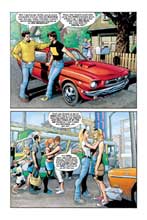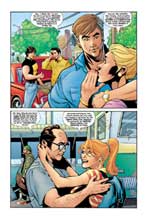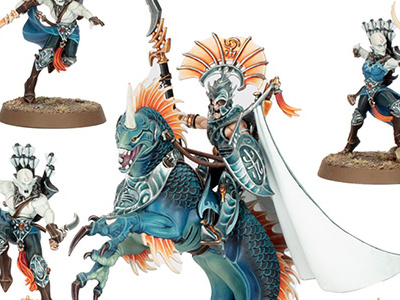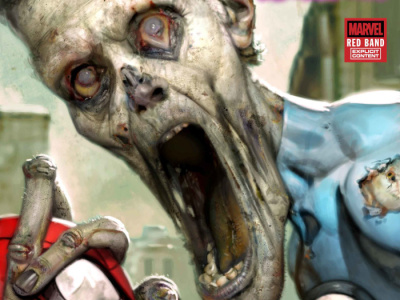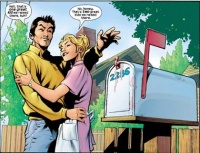
The chief topic at Friday's Marvel Press Conference was Trouble, the first book in Marvel's reconstituted Epic imprint (see 'Epic Returns as Creator-Packaged Line'). Originally entitled Parents, Marvel President Bill Jemas noted, 'Trouble at its inception was the story of Peter Parker's conception.' But during the development of the book, the focus of the creators shifted from the baby to the four teenagers, Ben, Richard, Mary and May. According to Jemas it is Mary and May who are the real heroes of this story. May, of course is Aunt May, a longtime fixture in the Spider-Man universe. It is quite apparent that Trouble is the story of the origin of Peter Parker, though not of his superpowers. But Jemas, with uncharacteristic understatement (and perhaps a fear of offending his licensing partners with the revelation that Peter Parker is illegitimate), stopped short of calling this an 'origin' book, by allowing that 'the final answer ought to come from the comic book community, based on acceptance of the story.'
When asked about the target demographic for Trouble, writer Mark Millar replied that he hoped it was a comic that appealed to everyone. He noted that the number of females at comic conventions had increased exponentially in recent years and confessed to doing research for this project by reading an assortment of romance and teen publications. Marvel clearly thinks that the superhero overtones of this story will make it palatable to comics fans, while the romance and relationship angles will appeal to female readers. Marvel has plans to market the graphic novel heavily through bookstores -- and while realizing the difficulty of getting the book racked in the appropriate areas where female readers can find it, Jemas was confident that 'David Gabriel, our new bookstore representative,' would be able to get the title positioned effectively. Marvel has already announced another product aimed a young female demographic, the illustrated prose novel Mary Jane (see 'Marvel Launching Fiction Line'), which should blaze a trail in bookstore distribution that Marvel can follow with a Trouble graphic novel.
If nothing else, Trouble will go down in comic book history as an interesting attempt to serve two vastly different demographics. It is possible that if Marvel can place the book properly, the teenage female demographic may be easier to reach than hardcore elements of comic fandom, since some fans already look askance at the Marvel editorial strategies that Jemas likes to characterize as 'made-you-look' marketing. Still the lure of an origin story, even if it's 'in utero,' is hard to resist as is the clean efficient art of Terry Dodson, whose style is a perfect match for the subject matter. Though some of Marvel's licensing partners may be put off by the specter of illegitimacy, there is no doubt, as Mark Millar pointed out, that the stigma of illegitimate birth is far less of a factor now than it used to be. In the final analysis the success of the project may boil down to Mark Millar's story -- and Marvel's editorial staff was unanimous in praising the narrative, which reportedly contains more than a few additional surprises. And on the marketing side, Marvel's support of the book is evidenced by its willingness to reverse longstanding policy to take advantage of the book's potential (see 'About Face: Marvel Reverses No Reprint Policy').



